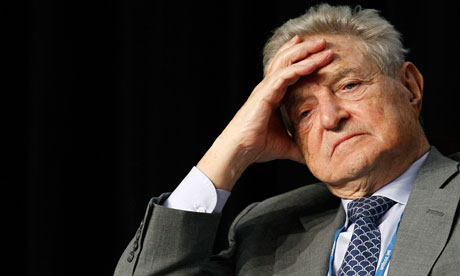George Soros to close hedge fund management group to outside investors
• Soros Fund Management to hand back $1bn to investors
• Quantum fund hit by new SEC rules
- guardian.co.uk,
- Article history

George Soros, the man who broke the Bank of England, has shut up shop. The billionaire hedge fund manager's firm is handing back $1bn to clients and has told them it plans to stop managing money for outside investors.
Soros, who turns 81 next month, became world famous after making millions betting that the UK would be forced to devalue the pound during the 1992 Black Wednesday currency crisis. More recently, he has become a philanthropist and social activist, pouring billions into causes including the promotion of democracy in eastern Europe and Africa, and ending the "war on drugs". He now intends to manage his own money but will no longer run investment funds.
"We wish to express our gratitude to those who chose to invest their capital with Soros Fund Management LLC over the last nearly 40 years," Soros's sons Jonathan and Robert, who are co-deputy chairmen of the investment firm, wrote in a letter to investors. "We trust that you have felt well rewarded for your decision."
They added that Keith Anderson, chief investment officer, would be leaving the firm, which has mostly overseen family assets since 2000.
Soros's sons said they took the decision to close to outside investors because of new financial regulations that would have made it necessary to register with the Securities and Exchange Commission, the US financial watchdog, by March 2012 if the firm had continued to manage money for outsiders.
Under the new rules, hedge funds with more than $150m (£90m) in assets must report information about their investors and the assets they manage, including potential conflicts of interest.
"We have relied until now on other exemptions from registration which allowed outside shareholders whose interests aligned with those of the family investors to remain invested in Quantum," the executives said in the letter, referring to Soros's flagship Quantum Endowment fund. "As those other exemptions are no longer available under the new regulations, Soros Fund Management will now complete the transition to a family office that it began 11 years ago."
Soros was born Dzjchdzhe Shorash in Budapest in 1930. After the Nazis invaded the city in 1944, his father arranged for false papers for family and friends that identified them as non-Jews.
"Instead of submitting to our fate we resisted an evil force that was much stronger than we were – yet we prevailed. Not only did we survive, but we managed to help others," he wrote in an essay in the New York Review of Books recently. He said the experience had given him an appetite for risk: "This left a lasting mark on me, turning a disaster of unthinkable proportions into an exhilarating adventure."
Soros emigrated to the UK in 1947 and started his career studying at the London School of Economics, moving to the US in 1956. In 1970 he and his business partner Jim Rogers opened Soros Fund Management. The pair proved to be outstanding investors. In 2010 Forbes listed Soros as the 35th richest man in the world, with an estimated fortune of $14.2bn.
Soros controls more than $24.5bn for himself, his family and his foundations. "Markets are constantly in a state of uncertainty and flux, and money is made by discounting the obvious and betting on the unexpected," he once wrote.
The Soros funds have been good long-term performers, returning about 20% a year on average since 1969. Recently the Quantum fund has underperformed, reportedly losing 6% in the first half of the year.
Robert Slater, Soros's biographer, told the Bloomberg news agency that he expected Soros to remain an active investor. He said Soros had made the move to protect the identities of his investors. "He's still going to have a $25bn hedge fund," said Slater.

No comments:
Post a Comment